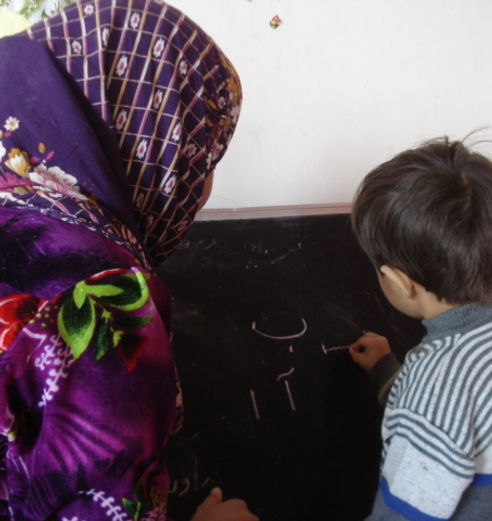
what
we
do
OUR MISSION
Wind of Hope is a non-profit organization dedicated to bringing non-violent, peaceful, and cooperative Montessori-inspired home-based early childhood education to Ghazni, Afghanistan.
Objective: To create a series of small classes, each with a teacher/mentor in a private home, using Montessori materials for early childhood development and learning.

WHY HOME BASED?
The Home School is a familiar educational model in Afghanistan. It was extensively used for girls denied opportunities for regular school education under the Taliban’s repressive anti-education regime. The security situation in Afghanistan remains dangerous.
PRE-SCHOOL
The Roots
The brain develops most of its neurons and is most receptive to learning in the early years of a child. Studies have shown that early education plays a critical role during this important developmental period. Pre-school education has a positive impact on the emotional, social, and intellectual development of children throughout their entire life. Through early education, children develop numerous skills including:
-
Communicating cooperatively and peacefully
-
Building self confidence
-
Learning critical thinking skills
-
Developing a positive attitude toward learning
Despite the importance of early education, the Afghanistan Government Ministry of Education (MofE) has no kindergarten or pre-school programs in Ghazni. Nor is there any chance of any such programs in the near or middle term because of financial constraints under which the MofE operates. At present, the MofE can only provide Afghanistan’s elementary school children with about half of the classroom time required to cover their curriculum. Throughout the country children go to school in shifts, with each child in school only about 3 hours a day (See “Report for 2015 by the Afghanistan Ministry of Education,” addressed to donor nations, on the state of education in Afghanistan, pages 19-25).


MONTESSORI-INSPIRED EDUCATION PROGRAM
The importance of the early years in the education of a child has been well established in over a century of studies. The Montessori educational methods for enhancing children’s early development are the most recognized and widespread across the world.
SELF-DIRECTED LEARNING
Learning to learn
Students select the physical materials of their choice with which to work and play from among the materials specifically designed to provide important lessons in math, science, social order, reading and writing. Because the child has selected the particular lesson, he or she is committed to it, and more interested in it, than if presented the subject matter chosen by the teacher (one size fits all), for the entire group of children.


PEACEFUL CLASSROOM
Dialogue, cooperation, and generosity
Students learn how to resolve disputes without resorting to violence. This is a very important aspect of the Montessori program, particularly in Afghanistan, where children have been constantly exposed to violence against women, violence against themselves, and violence by strangers against their parents and neighbors.
MENTOR
Aiding a child's impulse to learn
The Teacher in a Montessori school is not called a Teacher, but rather is known as the “Mentor”. In traditional schools, a teacher teaches -- but in a Montessori school, she mentors. A Mentor helps each child’s self-directed impulse to learn. The Mentor already understands and is committed to aiding the children in their personal exploration of the Montessori materials, rather than using the more formal rote lecture and memorization style of teaching, in which most adults in Afghan have been educated.



